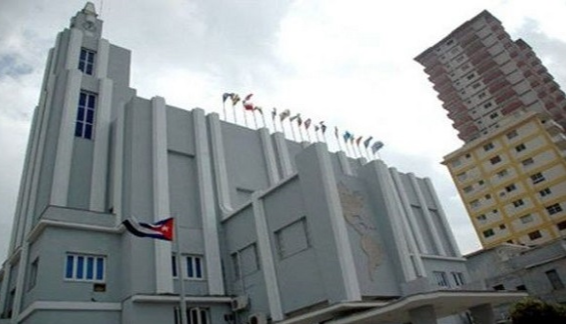
Casa de las Americas / Photo: Prensa Latina
A new ghost haunts the world: that of the rise of the extreme right and the rise of a fascism that we thought was banished to the history books. Endorsed at the polls, like almost a century ago, they do not hide to show their most impudent side. The most openly criminal is left for Gaza, where the world is once again witnessing a genocide that, right now, has the complicity or cowardice of a good part of the West.
The nightmare spreads across Europe, looms over the United States and reaches a Latin America that, after suffering the obscene presence of Bolsonaro, now suffers that of Milei, a character no less dangerous because he is grotesque.
It would be irresponsible not to take into account that the extreme right has gone from babbling platitudes to taking the initiative on capital issues for citizens. Champion of a “cultural war” understood as the fight against any demand for economic, political, social or cultural rights, no matter how basic they may seem, this new fascism is experiencing a moment of expansion that makes it feel emboldened and euphoric.
In the midst of such a disturbing panorama, the resounding victory of Claudia Sheinbaum in the elections in Mexico is encouraging, a recognition of the work of her predecessor and support for the Latin American vocation and the commitment to the poor that the president-elect will continue to carry forward. .
On July 28, Hugo Chávez, the leader who led the Bolivarian Revolution and demanded socialism for the 21st century, would turn seventy years old. Precisely that day the general elections will take place in Venezuela in which not a dozen candidates but, in essence, two society projects will face each other. The most powerful media outlets in the world have already chosen theirs. Obviously, that of the counterrevolution. The darling candidate of the opposition, and above all his mentor (the Empire's favorite card), are beginning to take up space in foreign legislative offices as well as in the press and on digital platforms. Once the attempts at assassination and invasion, the violent riots and terror, the sanctions and the theft of the country's resources, and even the farce of a spurious president without people, have failed, the media onslaught intensifies.
The disqualification machinery has already started. An influential Spanish newspaper, for example, is quick to slip in a poisonous suspicion: “The absence of observers from the European Union leaves the elections without robust oversight.” Other media outlets are already circulating alleged polls that give victory to the so-called Democratic Unitary Platform, as an argument to ignore any adverse results and as a contribution to the climate of distrust that is intended to be generated. It will not surprise anyone if in the coming weeks the campaign continues to raise the tone. More than preparing to win, the Venezuelan right seems ready to launch the accusation of fraud, which will undoubtedly have the immediate and enthusiastic support of many governments and media. It is a staging that we know well.
The history of Latin America and the Caribbean has oscillated between the abuse of which its people have been victims for centuries and the struggles they have waged with blood and fire for their freedom. If last year marked the bicentennial of the Monroe Doctrine, which would represent the imperial option, this year marks the anniversary of the Battle of Ayacucho, which sealed the independence of South America. It is not just a dispute between the candidate of the Bolivarian Revolution and one of his opponents. The onslaught of the hegemonic media does not allow us to forget that what is at stake today in Venezuela is, precisely, one of those two alternatives: either Monroe or Ayacucho.
Casa de las Americas, faithful for 65 years to the project of cultural emancipation of our America, calls on the intellectuals of the world, and particularly of the region, to closely follow the events in the brother country, the maneuvers of the local and global right, and to be alert to any attempt to usurp the sovereign decision of the Venezuelan people.
Havana, June 11, 2024

